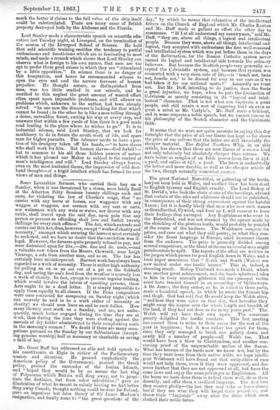The great National Eisteddfod, or gathering of the bards, has
just been held in Wales, and another blow has been dealt to English tyranny and English cruelty. The Lord Bishop of St. David's, who took the chair at one of the meetings, advised that certain of the odes and addresses should not be published, in consequence of their strong expressions against the hateful Saxon ; but it is hardly likely that men who bear such names as Genedlaethol, Cywiad, and Dan ap L will consent to have their feelings thus outraged. Any Englishman who went to the Eisteddfod, and was not stunned by the uproar made by the shrieking of the glorious bards, would probably be puzzled at the course of the business. The Welshmen compete for prizes, and rave out what they call poetry, in what they con- sider the finest language in Europe, amid incessant cheers from the audience. The prize is generally divided among several competitors, or the blood of the one successful man might peradventure be spilt. The reports of the affair are written in the jargon which passes for good English down in Wales, and a local paper announces that " North and South (Wales) are now united under one bardic banner." This is, indeed, a cheering result. Bishop Thirlwall was made a Druid, which was another great achievement, and the bards spluttered odes to him in their uncouth gibberish till the episcopal victim must have fancied himself in an assemblage of Ojibbeways. A Dr. Jame', the fiery orator, as he is called in those parts, made a beautiful speech, in which he smote the Saxons hip and thigh. God had said that He would keep the Welsh alive, "and here they were alive on that diy, that hereafter they might sway the sceptre over the whole length and breadth of the land, if they had not done so for miny years past." The Welsh will yet have their own again. The assurance greatly delighted the herdic conclave. This last meeting has caused them to retire to their caves for the rest of the year in happiness ; but it was rather too quiet for them, since they only managed to break one gallery down and nearly kill a number of people—all Welsh too. That would have been a blow to Christendom, and another con- vincing proof of the unquenchable malice of the Saxon. What has become of the bards now we know not, but by the time they next issue from their native wilds, we hope intelli- gent Welshmen will have found out that antipathies of race would not help them, even if they were oppressed, and dis- cover farther that they are not oppressed at all, but have the same laws and enjoy the same privileges as Englishmen. All the harm we have done them is to teal them well, dress them decently, and offer them a civilized language. The first two they receive gladly—the last they may take or leave alone ; but if they are wise they will forget their prejudtces, and throw their "language" away after the skins which once clothed their noble forms.


































 Previous page
Previous page